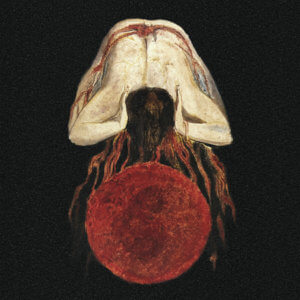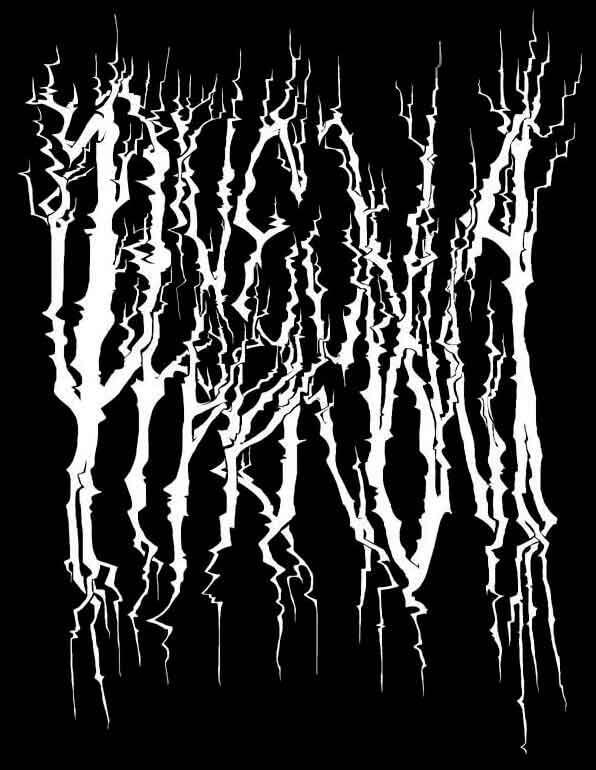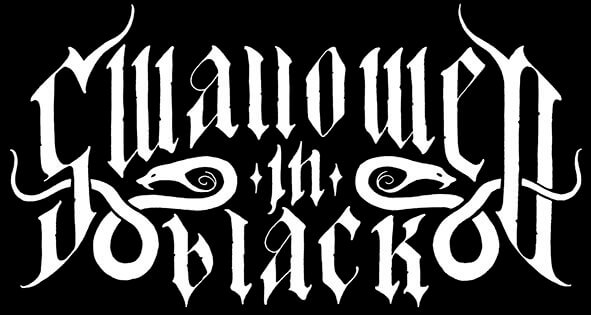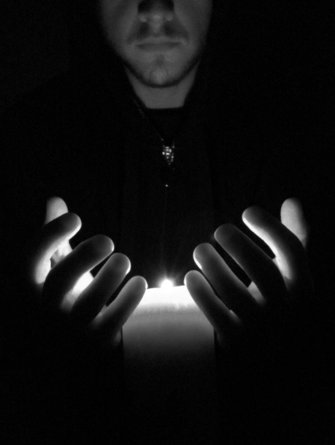“I SUPPOSE IT’S A METAPHOR FOR LIVING WITH A MENTAL ILLNESS, FOR LOSING PART OF ONESELF AND COMING FACE TO FACE WITH THE DARKNESS THAT REMAINS IN ITS PLACE” – PNEUMA HAGION
With ‘Voidgazer’, Pneuma Hagion has delivered a truly harrowing and ghastly debut full-length that bleeds bleakness, despair and alienation. I asked R, the tortured soul behind this disturbing yet enthralling recording, to discuss – amongst other things – the ideas and sentiments behind the music, how this project fits in with his various other musical expressions and the ever-more-disconcerting state of the world. He spoke about art reflecting life; music as a form of catharsis; the irreconcilable conflict between spirit and flesh, body and mind; how non-existence could be preferable to reincarnation; and enlisting the help of friends to enhance and capture the physical presence of sound.
 ‘Voidgazer’ is in many respects the antithesis of a life-affirming experience. It’s a bleak and oppressive listen, which accentuates for me the hopelessness and futility of existence. Yet, I don’t think it wallows in negativity or defeatism; it’s more an observation of reality – highlighting the cold, clinical and undeniable fact that life is short and destined to end soon (perhaps badly). Do you feel that when you compose music with dark and nihilistic themes that you are dealing in grim reality rather than being negative for the sake of it?
‘Voidgazer’ is in many respects the antithesis of a life-affirming experience. It’s a bleak and oppressive listen, which accentuates for me the hopelessness and futility of existence. Yet, I don’t think it wallows in negativity or defeatism; it’s more an observation of reality – highlighting the cold, clinical and undeniable fact that life is short and destined to end soon (perhaps badly). Do you feel that when you compose music with dark and nihilistic themes that you are dealing in grim reality rather than being negative for the sake of it?
“I don’t think I’m being negative for the sake of it. My music is an expression not only of who I am but of what it’s like to be me and unfortunately these things usually aren’t very pleasant. I’ve always been a generally negative and cynical person, and I’ve always created art that reflects that. However, I’ve been dealing with Obsessive-Compulsive Disorder for many years now and, although I don’t like the idea of being defined by a single thing (especially a thing like a mental illness), my experience with OCD has coloured all of my perceptions, has made my outlook on life much more grim and has taken a lot of the joy out of most things. As for the futility of existence, I guess I don’t know if it’s futile and pointless or not. Either way, it sure seems pointless. It feels pointless.”
The underlying theme of the album is of an ancient force being awakened from its slumber. Enraged to have been summoned (by mankind?) from interstellar space, it exacts fitting revenge by visiting death and pestilence upon the Earth. I noticed numerous mentions of the ancient ones, while the cosmic setting also leads me to believe that the concept might be inspired by the writings of Lovecraft? Is there also a reference to Nietzsche? That’s who jumps in to my mind when I consider staring into voids…
“At its core the album is about alienation. I think this is the central, deepest theme of all of my music. Associated with this is the theme of confinement or imprisonment. I usually try to express these notions through the symbolism and mythology of gnostic Christianity, which is also called Primitive Christianity. The primary symbolism I draw on is that of the Divine Spark imprisoned within the darkness of the flesh. As humans, we are comprised of two opposing essences: spirit and matter. Who we truly are is the divine Spirit, but we’ve somehow confused the issue and identified with the fleshly vessel which we inhabit. The world of flesh and matter is ruled by a cruel, tyrannical Demiurge, and we feel this universe to be cruel and evil because we are, at our core, alien to this place. We are from a place that is not a place, and is everything that this place is not.
“I use lots of symbolism from Primitive Christianity, but I’m not necessarily using it in a religious sense. This is not religious music, and certainly not in the sense of preaching some sort of revelation or acting as a medium of worship. I also draw imagery and symbols from Neoplatonism, Satanism, Chaos Magick and, as you noted, Lovecraft. I’m not a Neoplatonist or a Satanist, either. The point is that I’m trying to express something that can’t be expressed with words, and the thing being represented is not the representation itself. It requires archetypal symbols and other things that seem to speak directly to the unconscious mind, like music.
“The Lovecraft mythos is a perfect collection of interrelated symbols and ideas for the theme of alienation. Especially the idea of a vast, powerful, malevolent and ultimately mysterious force coming from outside of the universe of one’s experience and penetrating deep inside of one’s world and one’s mind. I often think of OCD as that force in my life, this thing that lives within my mind, which I recognize as being alien to me and hostile. I can’t fathom it, I can’t understand it, but I can feel its effects. I feel like a normal person imprisoned within a body and brain rendered dysfunctional by OCD. The disorder is the Demiurge, my body is the flawed universe crafted by the Demiurge, and I (the true I, the “real” me) am trapped here.”
 To what extent are you writing metaphorically or symbolically as opposed to a work of fiction to stir the senses? Reading the lyrics of the first and second tracks, ‘Aeons Of Slumber’ and ‘Summoning’ respectively, it seems like the ancient evil reawakened is possibly death itself (‘I arise again feasting on mortality, in the darkness I have waited, in the silence I have waited, woe to he who summons me’ / ‘Unseen I have slain entire worlds, in my hands I have suffocated stars, I sing to you whispers of non-existence’)?
To what extent are you writing metaphorically or symbolically as opposed to a work of fiction to stir the senses? Reading the lyrics of the first and second tracks, ‘Aeons Of Slumber’ and ‘Summoning’ respectively, it seems like the ancient evil reawakened is possibly death itself (‘I arise again feasting on mortality, in the darkness I have waited, in the silence I have waited, woe to he who summons me’ / ‘Unseen I have slain entire worlds, in my hands I have suffocated stars, I sing to you whispers of non-existence’)?
“It’s all symbolism and metaphor. I suppose it’s a metaphor for living with a mental illness, for losing a part of oneself and coming face to face with the darkness that remains in its place. On one level I create this music for the purpose of catharsis, as a way of sorting out my feelings. On a second level I do so because I’m a creative personality who needs to create things, whether I have a conscious reason to do so or not. If I’m not creating I feel even worse than usual. On a third level I share the music because I hope that it can speak to other people’s conscious and unconscious minds, and resonate with them in some way.”
There is no doubting that man has notions above his station. Driven to distraction all our lives by greed, materialism, ignorance and an understandable but doomed-to-failure quest for survival, we remain almost blissfully oblivious to our own mortality, powerlessness, insignificance and inevitable demise. I realise this is a bit of a sweeping question but, as you see it, what are the most obvious and essential flaws in the human condition?
“There is something about us which makes us fundamentally different from all other known creatures. Perhaps it’s the presence of consciousness, or the use of language, or something altogether different, but it’s clear that there is a gulf between us and other living things. This thing may be responsible for civilization and technology and lots of other interesting things, but I think that it’s also making us miserable. I think we’re living a dual, schizophrenic existence where we try to suppress this “animal” nature because we believe we’ve earned the right to evolve beyond it. I guess it’s similar to the gnostic idea I spoke about earlier; I think a lot of us feel alien not just to this world but to our own bodies, to our own nature as incarnate beings. Something just isn’t right. Something doesn’t feel right.”
For me, the dissonance between the vast bandwidth of the mind and mortal body is difficult to reconcile. Are we the body or the mind or both at once? Isn’t it a hideous anomaly to have a potentially sharp point of consciousness trapped within a decaying physical shell?
“I wish I knew the answers. Sometimes I think we are points of consciousness attached, for some inexplicable but probably stupid reason, to physical bodies. Then, other times I’m absolutely convinced we are nothing but meat machines, and that our consciousness is a temporary phenomenon contingent upon the presence of a functioning body. I would certainly prefer to be a point of consciousness, destined for something greater than sitting in traffic for 75% of a life that is 95% shit and then rotting in a grave for all of eternity. But then again, sometimes I think that consciousness can be a terrible thing and an eternity of being conscious means the possibility of an eternity of terrible things. I haven’t had a lot of fun in this life, and if reincarnation is my destiny, with my luck I’d be reborn a million times to suffer a million more miserable lives. In this case, non-existence seems absolutely wonderful.”
The refrain of ‘Drawn Down From The Stars’ – ‘Drawn down from the stars, now you’ll kneel before your God’ – could be interpreted as a reaffirmation of the belief that all life is cosmic in essence, that we are born of the stars and that all religion has been rendered redundant by the Big Bang and science. Do you believe that life is essentially stardust and that we are each inhabitants not of a particular town, country or even planet but of an infinite multiverse?
“It seems plausible to me that we are essentially stardust and nothing more, but of course I don’t know. It seems to be evident now that we are indeed stardust, but whether religions have anything truthful to add to that, I have no idea. I tend to think of myself as an agnostic, which I guess is ironic due to my interest in Gnosticism, but not only do I not know the answers to life’s essential, mysterious questions, but it doesn’t seem to be possible to know the answers at all. This is both distressing but also strangely awe-inspiring to me. As much as I crave answers and explanations, I also love the unknown. I love the idea of a mystery, especially one which apparently has no solution.”
 ‘Timeless Darkness’ (‘I bring disease from other worlds’) is especially poignant for the times that are in it, with mankind in utter chaos: It’s difficult to escape the feeling that as a race we are currently at a tipping point, existing in times of real darkness. Do you feel that humanity is reaching critical mass or has nothing really changed? Have we always been a hapless fluke of nature destined for self-destruction?
‘Timeless Darkness’ (‘I bring disease from other worlds’) is especially poignant for the times that are in it, with mankind in utter chaos: It’s difficult to escape the feeling that as a race we are currently at a tipping point, existing in times of real darkness. Do you feel that humanity is reaching critical mass or has nothing really changed? Have we always been a hapless fluke of nature destined for self-destruction?
“I think it’s tempting to think of these times as being cataclysmic or even apocalyptic in some sense, and the state of the world is very distressing, but I can’t convince myself that this is anything other than par for the course. Plagues are nothing new, nor are riots or conflagrations of civil unrest or wars or anything else under the sun. Having said that, it could be possible that we’re about to see some sort of paradigm shift in terms of geopolitics or something of that nature, but again I just wouldn’t think of it as being unprecedented in any way. This pandemic has often brought to my mind the old curse, ‘may you live in interesting times’.
As to the question of whether or not we are destined for self-destruction? Probably. If we don’t do it ourselves, it will happen as a matter of course. As far as I can tell, every species is destined for extinction at some point.”
The drums on the album are very strong and more prominent in the mix than on ‘Trinity’. Prior to ‘Voidgazer’, Pneuma Hagion was a one-man band. However, this time, you have brought your Excantation bandmate S on board to perform drum duties. As a skilled multi-instrumentalist yourself, why did you decide to bring a second body into the fold? Was there a particular style of drumming that you wanted to achieve or was it a case of two heads are better than one? And how pleased are you with the results?
“Recently I had begun programming the drums for most of my projects because, for various reasons, I had to sell my drum kit. This was not a pleasant experience, as the drums were my first instrument and the one I always enjoyed the most. Shane and I were talking about my plans for the Pneuma Hagion album, and we both agreed that it would sound best with real drums. I play in several projects with Shane and it was an easy decision to make to bring him in on drums. In a way I covet the control I have over my projects, but every now and then it’s interesting to relinquish a bit of that control and to let someone else put a bit of their own stamp on the music. Although I wrote the bare essence of the drums, Shane added his own touches and I was pleased to hear these possibilities that I wouldn’t have created on my own.”
The production is superb – organic and wholesome. Vitally, the music remains refreshingly raw and sort of stripped-back and very much of the underground, yet everything has space to breathe and is clearly audible. To my ear, ‘Voidgazer’ sounds clearer, more focussed and more vivacious than the demos. Did you handle all the recording, mixing and mastering again yourself this time around or did you approach anything differently?
“In the past I had recorded and mixed everything myself, but for this album I wanted the most massive, powerful sound I could get. A good friend of mine, Mike G., is an audio engineer of rare talent and I knew he could get the sound I wanted, and more. So, Shane tracked the drums in his own studio and I tracked the vocals in my home, then we went to Mike’s studio where I tracked the guitars and bass and where the mixing happened. It was an interesting synthesis.
“For this album I wrote all of the songs in G standard tuning, as I wanted to harness as much low end as possible. Mike brought everything together, made it all clear, gave it space to breathe, and most satisfying for me, he made the low end louder than hell. The physical presence of sound is something that I love and I wanted to create some sort of massive, suffocating presence with this album, especially in the rumbling, thunderous low end.”
As well as Pneuma Hagion, you are also involved in a wealth of other bands across the Death Metal, Black Metal and Funeral Doom subgenres. Where does Pneuma Hagion fit in with the rest of your work? Although I’m sure none of these are uplifting, I’m guessing this is your darkest and most depraved output – is it an expression for a particular aspect of your psyche or a darker part of your personality?
“My projects do sometimes seem like outlets for different aspects of my psyche. I don’t know if Pneuma Hagion is inspired by the darkest parts; that designation might belong to my Funeral Doom project The Howling Void. Most of my music is inspired by images and there may be a way of decoding the archetypal symbolism in those images to understand the deeper psychic message, but that’s beyond my ability. Most of the time I have no real idea what I’m doing other than creating music that I want to hear. All of my projects are about that: I have an idea of a certain atmosphere and certain imagery that evokes that atmosphere, then I try to write songs that allow me to experience it in a real way, as opposed to simply imagining it.”


